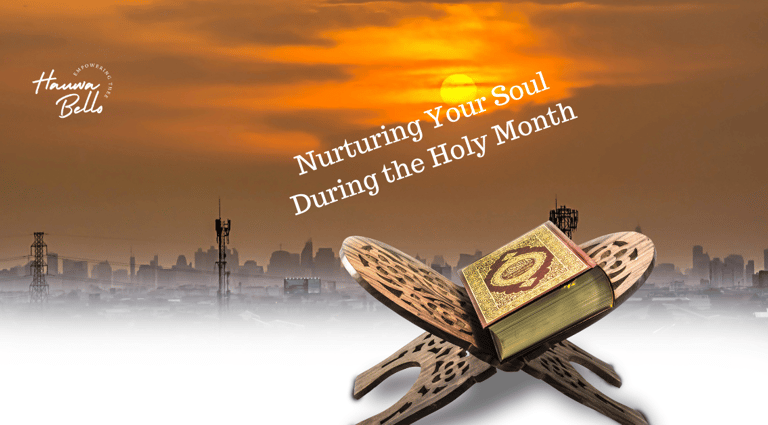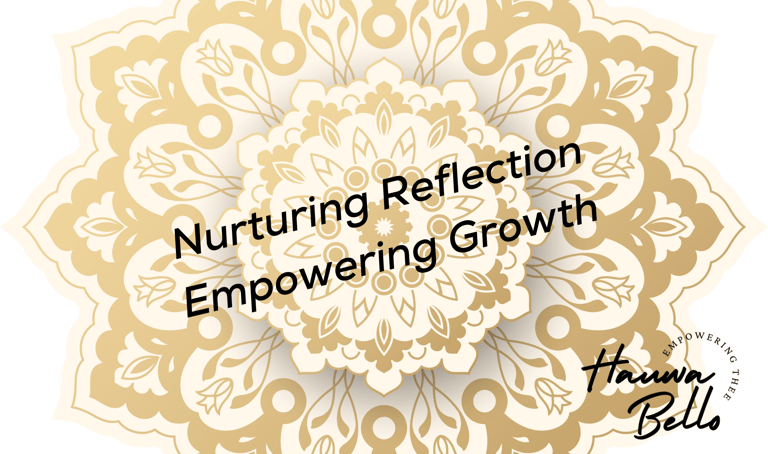Unlocking Spiritual Growth: A Mindful Ramadan Journey
Welcome to our latest blog post, where we delve into the beautiful intersection of mindfulness and Ramadan. As Muslims around the world prepare to embark on this sacred journey of fasting, prayer, and reflection, we invite you to explore how incorporating mindfulness can deepen your connection with Allah and nurture your soul during this blessed month. Ramadan is not only a time of physical fasting but also an opportunity for profound spiritual growth and self-discovery. By bringing mindfulness into our practices, we can cultivate a state of presence, gratitude, and compassion, enhancing our overall Ramadan experience. Join us as we uncover practical tips for infusing mindfulness into every aspect of Ramadan, from mindful fasting to prayerful reflection and acts of charity. Together, let's embrace this transformative journey and make this Ramadan a truly enriching and soul-nourishing experience.
Hauwa Bello... empowering thee
3/1/20246 min read


Ramadan, the holy month of fasting and prayer, is a time of deep spiritual reflection and self-discipline for Muslims around the world. It is a time when individuals strive to strengthen their connection with Allah, seek forgiveness, and engage in acts of charity and selflessness. While the traditional practices of fasting, prayer, and reciting the Quran are central to Ramadan, incorporating mindfulness into these practices can lead to a profound spiritual journey and personal growth.
Understanding Mindfulness
Mindfulness, a practice rooted in ancient Buddhist teachings but a core practice in Islamic tradition, has gained popularity in recent years for its ability to cultivate a state of present-moment awareness and non-judgmental acceptance. It involves paying attention to one's thoughts, emotions, and physical sensations with a sense of curiosity and compassion. By bringing mindfulness into Ramadan, individuals can deepen their spiritual experience and better understand themselves and their relationship with Allah.
The Mindful Approach to Fasting
During Ramadan, fasting from dawn to sunset is a fundamental practice. However, a mindful approach to fasting goes beyond abstaining from food and drink. It involves being fully present and aware of the physical sensations and emotions that arise during the fast. By observing these experiences without judgment, individuals can cultivate gratitude for the sustenance provided by Allah and develop a deeper appreciation for the blessings in their lives.
Practical Tips for Mindful Fasting During the Day:
1. Begin each day with intention: Set a clear intention to approach the day's fast with mindfulness and purpose. Reflect on the spiritual significance of fasting and the opportunity it provides for self-reflection and growth. Use The Mindful Muslim Ramadan all-in-one Journal and Planner to record your reflections.
2. Eat mindfully during Suhoor and Iftar: Pay attention to the food's taste, texture, and aroma. Begin eating with bismillah (and other before-meal duas of choice), chew slowly and savour each bite, expressing gratitude for the nourishment it provides. You can say bismillah before each bite to deepen your mindfulness practice and connection to Allah. Preplan your Suhoor and Iftar before Ramadan begins by using The Mindful Muslim Ramadan all-in-one Journal and Planner to avoid time-wasting during the blessed month. You can also track your meals daily with the planner.
3. Stay hydrated and mindful of thirst: Drink water mindfully, being aware of the sensation of quenching your thirst. Mindfully follow the sunnah of taking water by saying bismillah, taking a sip and then breathing while mindfully being aware of the sensation of quenching your thirst (avoid breathing into the water). Take two more sips while also taking a moment to appreciate the importance of water in sustaining life. Follow these three sips with more gulps as you need to fill one-third of your stomach. Track water taking to hydrate yourself using The Mindful Muslim Ramadan all-in-one Journal and Planner.
4. Notice hunger pangs without judgment: Instead of resisting or suppressing hunger pangs, observe them with curiosity. Recognize that they are temporary and a reminder of the sacrifice made during fasting. Use these moments to pray to Allah, telling him how you desperately want his mercy and seek his acceptance of your worship. The Mindful Muslim Ramadan all-in-one Journal and Planner has a dedicated prayer deduced from the Quran for each day written in Arabic and its English translation. Use this dua at the moment, praying to Allah the way he has taught in his book
5. Use prayer as a mindfulness anchor: During the day, engage mindfully in the five daily solahs to bring yourself back to the present moment. Focus on the words and meanings of the prayers, allowing them to deepen your connection with Allah. Before and after each obligatory prayer, if able, say your nawafils solahs using these nawafils as primers for the main solat. The Mindful Muslim Ramadan all-in-one Journal and Planner has spaces to track your Solah and Nawafil, track your patterns, and note whether you were mindful.
6. Evening Contemplation: As the day draws to a close, engage in a mindful review of your actions. Reflect on moments of gratitude, your iman level, your primary mood for the day, areas for improvement, and express gratitude for the opportunities provided by Allah. In The Mindful Muslim Ramadan all-in-one Journal and Planner, there is a space to write what you are grateful for on the day, areas to track your mood and iman and areas to review your actions for the day and plan for tomorrow, Allah sparing your life and so much more.
Mindful Reflection and Prayer
Alongside fasting, Ramadan is a time for increased prayer and reflection. By incorporating mindfulness into these practices, individuals can enhance their spiritual growth and connection with Allah.
Practical Tips for Mindful Reflection and Prayer:
1. Create a dedicated space for prayer and reflection: Set aside a quiet and clean area where you can engage in worship (extra worship for males) and reflection without distractions. Decorate the space with items that inspire and uplift your spirit.
2. Begin with deep breathing: Before starting your prayer or reflection, take a few deep breaths to centre yourself and bring your attention to the present moment. Focus on the sensation of breath entering and leaving your body.
3. Engage in Quranic recitation mindfully: Do so with intention and presence when reciting the Quran. Reflect on the meanings of the verses and allow them to guide and inspire your thoughts and actions.
4. Practice gratitude during supplication: When making supplications, express gratitude for the blessings in your life. Cultivate a sense of appreciation for the opportunities and challenges contributing to your spiritual growth.
5. Embrace silence and stillness: After prayer or reflection, sit in silence and stillness for a few moments. Allow any thoughts or emotions to arise and pass without judgment. As the world continues to busy itself, carving out moments of silence allows you to connect with the quietude within. In these moments, the whispers of your soul and the guidance of Allah become clearer. This practice can deepen your connection with Allah and promote inner peace.
Acts of Charity and Service
Ramadan is also a time for acts of charity and service to others. Individuals can cultivate compassion and empathy by approaching these acts mindfully, fostering their spiritual growth.
Practical Tips for Mindful Acts of Charity and Service:
1. Approach charity with a compassionate mindset: When engaging in acts of charity, do so with a genuine desire to alleviate the suffering of others. Practice empathy and strive to understand the needs and experiences of those you are helping. The Mindful Muslim Ramadan all-in-one Journal and Planner has dedicated pages for charity suggestion list; use this list to choose acts of charity you may want to engage in, and you can even indicate when you would like to engage in them.
2. Be fully present during acts of service: Whether it is volunteering at a local organization or helping a neighbour, be fully present and engaged at the moment. Listen attentively, offer a helping hand, and show kindness and respect to those you serve.
3. Reflect on the impact of your actions: After engaging in acts of charity and service, take time to reflect on the impact of your actions. Notice the emotions and thoughts that arise, and use this reflection as an opportunity for personal growth and self-awareness.
4. Practice self-compassion and self-care: Remember to prioritize your well-being while serving others. Engage in self-care practices, such as meditation or journaling, to replenish your own energy and maintain a balanced approach to charity and service.
5. Extend acts of charity beyond Ramadan: Carry the spirit of charity and service beyond the holy month of Ramadan. Look for opportunities to make a positive impact in the lives of others throughout the year, fostering a lifelong commitment to mindful acts of kindness.
Incorporating mindfulness into Ramadan practices can unlock profound spiritual growth and deepen one's connection with Allah. By approaching fasting, prayer, and acts of charity with intention, presence, and compassion, individuals can embark on a mindful Ramadan journey that nurtures their souls and enhances their overall well-being.
Do note that - A mindful Ramadan journey is a deliberate choice to infuse each day with purpose and awareness. You get what you put in. As you fast, pray and engage in acts of kindness, remember that each moment is an opportunity for spiritual growth. When you unlock the transformative power of mindfulness, you not only enhance your Ramadan experience but pave the way for profound spiritual development that extends beyond the holy month. Embrace the mindfulness within, and let it illuminate your path toward spiritual enrichment and closeness to Allah.
May this Ramadan be a transformative experience for all who embark on this mindful journey. Ameen




Subscribe to my newsletter for articles on holistic living, mental health, mindfulness, faith, and more.



